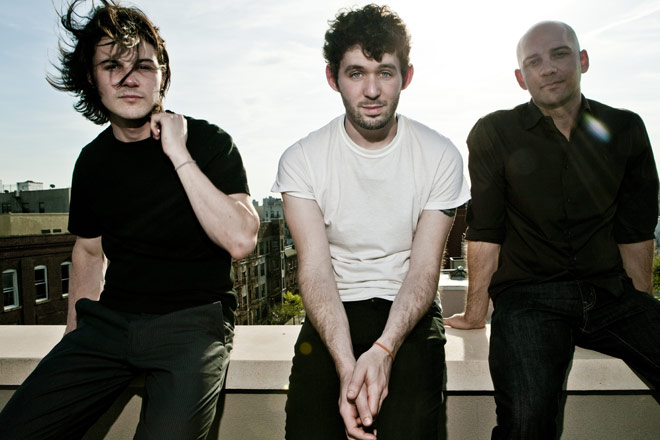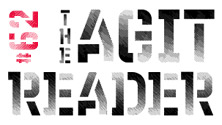
Bedside Manners
by David Holmes
Right now, the Antlers are riding high on the well-earned success of their self-released album, Hospice. In February, the record beat out Animal Collective’s Merriwether Post Pavilion and Dan Deacon’s Bromst to be named NPR’s “Best Album of 2009 So Far.” Then in July, the Brooklyn band scored a coveted slot playing at the Pitchfork Music Festival. And just last week, Frenchkiss reissued Hospice, having it re-mastered by Greg Calbi, who’s done work for Yo La Tengo, Interpol and Grizzly Bear, among other indie rock idols.
But the origins of Hospice exist in a much darker place. Following a traumatic break-up and the death of someone close to him, Peter Silberman decided to write a concept album about a hospice worker caring for a woman dying of bone cancer. The result is a terrific and terrifying record that couples the rich storytelling and heart-wrenching poignancy of great fiction with unsettlingly, infectious sound collages that recall the Microphones and Neutral Milk Hotel. Hospice possesses the high drama and sincerity of bands like Arcade Fire, but imbues that dynamic emotional landscape with a harsher, less polished DIY aesthetic that makes the record sound just as full but with none of the bombast. A thrilling and disturbing tale of grief and redemption, it is a monumental achievement that, six months after its original release, still stands alongside the year’s best albums.
I recently caught up with Peter a couple days before the band’s CD re-release show to talk about the songwriting process, his literary influences, and the death of the album as we know it.
So when did you start playing as the Antlers?
Peter Silberman: It must have been 2006. At the time, I wasn’t playing in a band, but I wanted to move in that direction. So I came up with this name the Antlers. and I started playing with some people in the spring of 2007. The line-up changed a bunch, and then it became just the three of us—Michael (Lerner), Darby (Cicci) and I—about a year ago. Since then, we’ve been touring a lot, spending a lot of time together, and getting very comfortable with one another as musicians.
Prior to the solo project, had you played in any bands?
PS: I had played in bands growing up—that’s what I spent a lot of time doing. There was one band that I’d been playing in from the age of 11 until 17, but I was only the guitar player. I never sang. I never even tried singing until I was about 18. I enjoyed it, but I wasn’t comfortable with it. I didn’t really have any control over my voice, but I wanted to keep going with it, wanted to give it a shot.
What was the name of that first band?
PS: Oh, we went through a lot of incarnations that were all really bad. All kind of embarrassing high school band names.
Don’t remember any of those?
PS: (laughs) I try not to.
I want to talk a little bit about the album, Hospice. Reading the lyrics independent of the music is like reading a great short story or an extended poem. Did you have an interest in creative writing or poetry prior to making music?
PS: Yeah, I was always interested in creative writing, but I couldn’t really find a voice and I couldn’t find my own style with it. But I’ve always loved reading, especially short stories and fiction. There were a couple things that I was reading prior to and while writing the record and these all found their way into what was being written, the way everything was shaped.
What were you reading at the time?
PS: Before the album even came about at all, I was reading a lot of Raymond Carver. I was fascinated at the way he could really pinpoint the way a relationship could die, the way people could just stop talking to one another. Around the time I was working on the record I started reading some Leonard Michaels. Similar, but a lot weirder. Much more about insanity in relationships and irrational behavior, very unexpected actions. He wrote this novella called Sylvia based on his wife, and I had a very parallel experience to it. The coincidence was very strong. I was reading all those things at the time and reading some of Ted Hughes’ poetry, a collection called “Birthday Letters” that he wrote for Sylvia Plath after she died. All these things started to make sense together, and I wanted to direct them toward this album that would encapsulate all of that in addition to experiences in my life.
I read that for about a year and a half, you’d distanced yourself from family and friends. Do you think Hospice would have still been made had you not isolated yourself for a while, or do you think the isolation was a necessary part of the creative process for you?
PS: Um, well it’s tricky because the isolation wasn’t a conscious decision. It was really the result of a situation I was in. And I wasn’t happy that I was separating myself from everybody. But at the same time I wasn’t necessarily aware of the fact that I was doing it or the severity of what I was doing. So Hospice is about what happened during that isolation, and I don’t think the record could’ve been made at all unless that had happened.
I’m really interested in how you crafted the vocal melodies on the album. They sound almost like nursery rhymes, which contrasts beautifully with the heavy subject matter. Was that intentional?
PS: The melody for “Bear” and “Epilogue” are pretty much the same melody. Anytime I tried to write a song, it would always be to that one melody and it was kind of like writing the same song 10 different times but with different lyrics. But that one melody kept coming back to me. It does sort of sound like a nursery rhyme. I don’t know if it was an intentional thing, but it made sense to me while I was doing it. I was really glad that it wasn’t just sounding dark and being dark and it was that contrast which was really important.
The album contains a lot of very intimate, quiet moments. Is it difficult to translate that feeling when playing the songs live?
PS: I think the inevitable problem of playing a live show is lyrics getting lost. If you are playing for people who have never heard the album before, it’s sort of to be expected that they’re not going to remember what you’re singing about. I think we’ve kind of recognized that and the way we’ve reacted to it is by creating a sound that brings about the feeling of the record, whether or not those lyrics are understandable—kind of a big, washy, dramatic kind of sound. And we play a little bit looser than on the record. They’re a little bit more open-ended and that’s helped them breathe a little bit more.
For the reissue, Frenchkiss has remastered the album. How much were you and the band involved in that process?
PS: I was in the studio during the mastering session, which was a really great experience to get to sit beside someone (Greg Calbi) who’s mastered so many amazing albums over such a long period of time and get to see him transform this record into what I’d always hoped it would sound like. But we definitely had specific points that we conveyed to him about what we wanted brought out and what we wanted to hold back a little bit. In the end, I was so unbelievably happy with the way it turned out as a result of him mastering it.
Has there been any talk about reissuing In the Attic of the Universe or any of the old EP’s?
PS: We’ve talked about it. We’re not sure what we want to do. We’ve basically run out of hard copies of In the Attic of the Universe and we might just press a few more without actually releasing it just to have with us while we’re on tour. And as far as the old EPs, I’d like to do something with them, but I’m not sure what. Time will tell with that.
In this age of Pandora and file-sharing, there’s been a lot of talk about the death of the album. What are your thoughts on that considering you’ve just put out a record that tells a rich story that’s designed to be experienced from start to finish?
PS: Um, I think the album is... I don’t think it’s dead, I think it’s in danger. I think people started moving toward a place where they were valuing a couple good songs, and songs they wanted to hear over and over again and remixed and all of that. It’s also become easier and easier to make records and so it’s become easier and easier to create mediocre ones. I would hope that they don’t become extinct. With file-sharing, I hope that people would be stealing entire albums, and in a way, that would force bands to work more on creating an album that is good all the way through. I think, in a way, file-sharing is going to bring the album back. I think an album will catch on more if it’s solid all the way. People will steal an album, and they won’t buy it because they’ll have a chance to hear it all the way through and hear where the quality dips, where it becomes less interesting, where it feels like there’s filler. So they can make their judgment before buying it.
So what’s next for the band?
PS: We’re going to be leaving on tour at the beginning of September, going to the UK for about a week, and then we’ll go out on tour here in the U.S. for about three weeks. Then we’ll be back home and my guess is we’ll go back on tour again until Thanksgiving. And if we get some time off, we’ll start working on a new record. But it would have to be a significant amount of time off. We want to spend a good amount of time on it and do it right.
